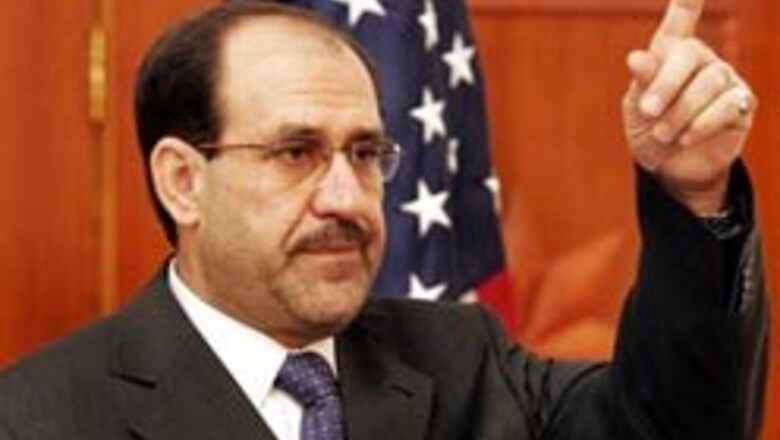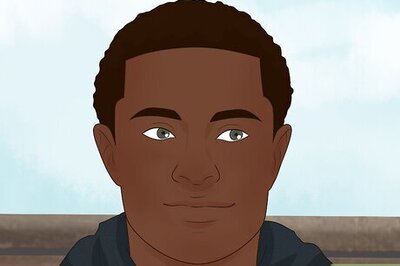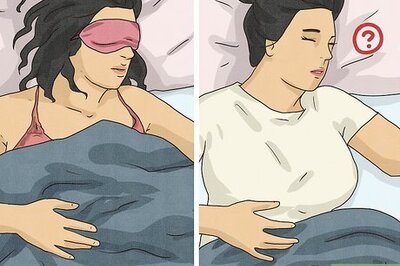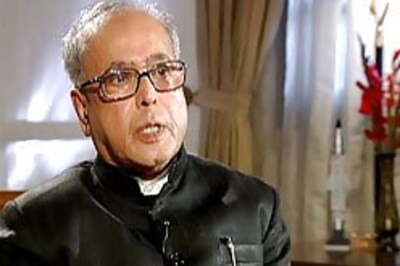
views
Baghdad: An angry Prime Minister Nouri al-Maliki disavowed a joint US-Iraqi raid in the capital's Sadr City slum on Wednesday, and criticised the top US military and diplomatic representatives in Iraq for saying his government needs to set a timetable to curb violence in the country.
Al-Maliki spoke at a news conference a day after US Ambassador Zalmay Khalilzad said Iraqi leaders had agreed to set deadlines by year's end for achieving specific political and security goals laid out by the United States, including reining in militia groups.
"I affirm that this government represents the will of the people and no one has the right to impose a timetable on it," the prime minister said.
The prime minister dismissed US talk of timelines as driven by the coming midterm elections in the United States. "I am positive that this is not the official policy of the American government but rather a result of the ongoing election campaign. And that does not concern us much," he said.
Al-Maliki complained that he was not consulted beforehand about the Sadr City offensive. The raid was conducted by Iraqi special forces backed by US advisers and was aimed at capturing a top militia commander wanted for running a Shia death squad.
"We will ask for clarification to what has happened," al-Maliki said. "We will review this issue with the Multinational Forces so that it will not be repeated."
Mouwafak al-Rubaie, his national security adviser, later told The Associated Press that al-Maliki's anger grew out of a misunderstanding that had since been cleared up with General George Casey, the top U.S. commander in Iraq.
While the US military said the raid had been cleared in advance with al-Maliki's government, President Bush acknowledged that al-Maliki himself may not have been consulted.
"We need coordinate with him. That makes sense to me. And there's a lot of operations taking place which means sometimes communications are not as good as they should be. And we'll continue to work very closely with the government to make sure communications are solid," Bush said at his own news conference.
Military action in Sadr City is especially sensitive for the prime minister.
Until Wednesday, US and Iraqi forces had largely avoided the densely populated slum, a grid of rutted streets and tumble-down housing that is home to 2.5 million Shia and under the control of anti-American cleric Muqtada's al-Sadr's Mahdi Army.
Reining in the Mahdi Army and the other major militia, the Badr Brigades, remains one of the thorniest problems facing al-Maliki. His fragile Shia-dominated government derives much of its power from the al-Sadr's faction and from the Supreme Council for the Revolution in Iraq, or SCIRI, which operates the Badr Brigades.
The US military said Mahdi Army militiamen fought back in the Sadr City raid and that the Americans called in an air strike and cordoned the sprawling east Baghdad region.
Late on Wednesday the military said it had killed 10 suspected militia fighters and wounded two in the battle. It did not identify the wanted militia leader or say whether he was still at large. Earlier, police and hospital officials said four people were killed and at least 18 wounded.
The military also said it had raided a mosque in Sadr City looking for a missing US soldier and his kidnappers. The soldier was not found but three suspects were detained.
Residents living near Sadr City said gunfire and air strikes began about 2300 hrs on Tuesday and continued for hours. The neighborhood was sealed to outsiders before dawn.
Groups of young men in black fatigues favored by the Mahdi Army were seen driving toward the area to join the fight. Explosions and automatic weapons fire were heard above the noise of US helicopters circling overhead firing flares.
Crowds of Shia men, some carrying pistols and others hoisting giant posters of al-Sadr, swarmed onto the district's streets Wednesday morning, chanting, "America has insulted us."
Throughout the day and into the night, US F-16 jet fighters growled across the Baghdad sky, and at one point the report of tank cannon fire echoed across the city five times in quick succession.
Streets were empty and shops closed, although the district still had electricity from the national power grid.
Well after nightfall, residents said all roads into the slum remained blocked by U.S. and Iraqi forces. US soldiers were searching all cars.
A frustrated motorist waiting at one checkpoint jumped out of his car and called for al-Maliki to resign.
"Where is al-Maliki? It would be more honorable for him to resign. Why is he letting the Americans do this to us," the driver could be heard to scream.
Falah Hassan Shanshal, a lawmaker from al-Sadr's political bloc, said women and children had been killed, although videotape pictures of the bodies from the neighborhood taken at the local morgue showed only male victims.
"If there was an arrest operation, it should have been carried out by the Iraqi authorities, and not like this where air cover is used as if we were in a war zone," Shanshal said in an interview with the government's al-Iraqiya television station.


















Comments
0 comment